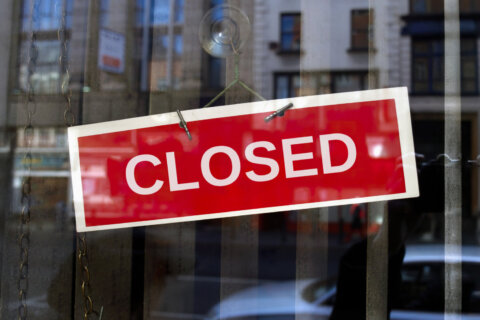If it feels like you can’t find a once-ubiquitous food truck in the nation’s capital these days, there’s good reason — they’ve left.
The arrival of the coronavirus pandemic has devastated the recently burgeoning local food truck industry and threatens the future of small business owners who are scrambling to eke out enough sales to stay afloat.
“The suffering is severe,” said Zack Graybill, chairman of the DMV Food Truck Association, and owner of D.C. Slices. “It’s bleak.”
Graybill told WTOP just-completed polling of local drivers shows 43% are using their own funds to support their small business, and 24% are relying on the generosity of family and friends to weather the pandemic’s perfect storm.
The disappearance of food trucks has made for a striking view of Washington’s streets.
“In peak season, according to the Department of Health, there’s approximately 900 food trucks that come to D.C.,” Graybill said. “Now, 90% are not vending in D.C. anymore.”
The clientele has vanished.
“Our bread and butter was our lunchtime crowds. Office workers, streaming out of their buildings, could easily get a meal from us. The majority of people are no longer working from their offices,” Graybill said.
Food trucks have always faced another challenge in D.C., which has been compounded by stressors related to COVID-19.
“The second factor is you have restaurants, takeout spots, all over the city already. It’s an urban area. Walkability is awesome, and there’s so many options. Competition is high,” he said.
Without the stability provided by downtown customers, Graybill said many food truck owners are taking a chance on the suburbs.
“It’s better than nothing,” Graybill said. “It carries a lot of risk with it, and it’s not as good as what we used to experience.”
Succeeding in residential vending relies on community support, he added.
“There’s typically a few people that email people, they reach out through HOAs, or listservs, or Facebook, and they let the community know. It only takes a handful of people to come out to buy food for their family for that food truck to survive.”
More than 60% of truck owners polled said they anticipate the effects of COVID-19 will be felt financially for more than a year. The risk is heightened because business evaporated during what is typically the strongest part of a food truck business’s year.
“What’s going to happen in winter?” Graybill asked. “We haven’t been able to build up the normal reserve that we would to survive winter.”
While most businesses have been severely challenged by the coronavirus pandemic, Graybill said food truck owners are often the smallest of small businesses.
“Two-thirds haven’t tried to get Paycheck Protection Plan and Economic Injury Disaster Loans, and it may be due to the fact that many might struggle with English as a second language, and their comfort of knowing the system,” Graybill said.
He fears food truck owners, who offer D.C.-area customers the chance to sample food from around the world, will need to choose other businesses to support their families.
“It would be tragic to lose those risk-takers, those entrepreneurs,” Graybill said. “It would be tragic to lose such cultural wealth.”








